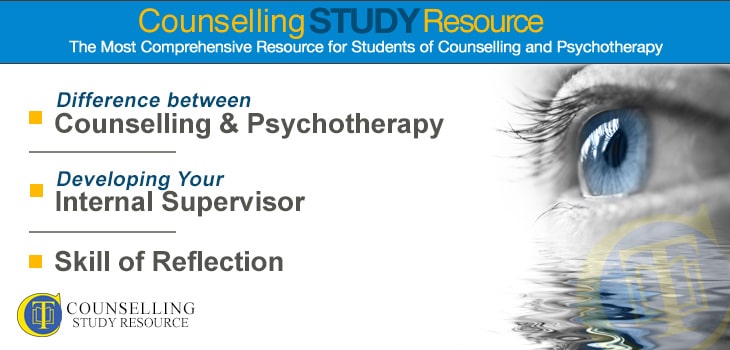096 – Difference between Counselling and Psychotherapy
Practice Matters: Developing Your Internal Supervisor – Skill of Reflection
In episode 96 of the Counselling Tutor Podcast, Ken Kelly and Rory Lees-Oakes clarify the difference between counselling and psychotherapy. In ‘Practice Matters’, Rory looks at how to develop your own internal supervisor. Last, the presenters discuss the skill of reflection in counselling.
Difference between Counselling and Psychotherapy (starts at 2.16 mins)
What is the difference between counselling and psychotherapy? Or what is the difference between a counsellor and a psychologist?
This question is often asked in our Facebook group, which includes over 20,000 people (students, tutors and qualified counsellors) interested in the world of counselling and psychotherapy.
Rory explains that the key difference here is that psychotherapy generally requires a higher level of training, with most practitioners qualified at level 7 (master’s degree level) on the National Qualifications Framework.
Examples of psychotherapy modalities include transactional analysis (TA) and gestalt therapy. Psychotherapists may be able to diagnose mental-health conditions, and also to treat more serious ones (e.g. personality disorders). As a result of all these factors, they may well charge a higher hourly rate.
Ken points out that the two terms – ‘counselling’ and ‘psychotherapy’ – used to be used more interchangeable, but that this is less so now.
While both professions can join the British Association for Counselling and Psychotherapy or National Counselling Society, there are more stringent entry requirements for the UK Council for Psychotherapy.
Ken and Rory go on to discuss the importance of the therapeutic relationship in all modalities, and in particular the ‘relational turn’ in TA.
Here in the Counselling Study Resource, you can listen to a lecture on TA and find useful diagrams comparing/contrasting modalities (a common requirement in assignments).
Developing Your Internal Supervisor (starts at 14.15 mins)
In ‘Practice Matters’, Rory talks about the work of British psychanalyst Patrick Casement, who developed the idea of clinical supervision and first coined the term ‘internal supervisor’.
Rory explains how to use your learning journal and process notes to help develop your own internal supervisor.
*For tips on how to write a reflective journal, see Rory's video below.
Rory explains the particular importance of ensuring you receive the right amount of supervision as a student counsellor. With supervision, you can look at transference and countertransference, boundaries, games, projective identification, legal and ethical issues, self-care, and what we can learn from our clients.
Skill of Reflection (starts at 17.51 mins)
This skill is perhaps one of the most underused in counselling, and is very powerful.
It is often conflated with paraphrasing, which inevitably involves applying our own interpretation of what the client has brought.
In contrast, when we use reflection, we provide much more of a mirror image of the client’s material.
The most powerful use of reflection is to mirror back to the client the emotion that they bring to a story/narrative, which may be displayed through their words or body language (including tone of voice).
It is in the emotion that the real work of counselling lies – enabling the client to delve more deeply into their personal process. Repeating the key feeling words back to the client can be really revealing to the client, enabling them to hear them as if for the first time.
Not all clients may have access to the ‘emotional palette’ needed to describe how they are feeling, and reflection can help them to explore emotions and develop their ability to look at and talk about these.
To learn more about the skill of reflection, Ken recommends looking at episode 2 of the Counselling Tutor Podcast, where you can hear a simulated counselling session using reflection.


